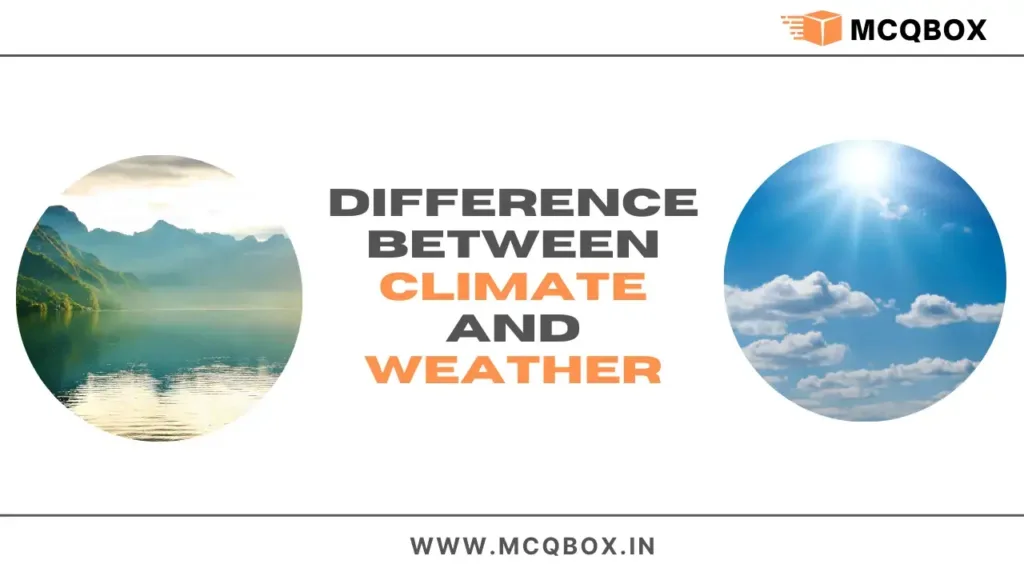Ever wondered about the difference between climate and weather? Check out this post for a clear explanation to help you understand both concepts better.

Table of Contents
Definition of Climate
Climate refers to the long-term atmospheric conditions of a specific location. It encompasses the average summation of various atmospheric elements observed over an extended period. These elements include temperature, solar radiation, precipitation, humidity, wind, and atmospheric pressure.
Climate records are maintained by respective centers in specific zones, detailing factors such as rainfall amounts, extreme temperature highs and lows, and other relevant data. Forecasting future climate conditions relies on analyzing historical climate data spanning at least 30 years.
MCQs on Environmental Studies
Definition of Weather
Weather refers to the daily atmospheric conditions of a particular place. It is essential for understanding how atmospheric conditions affect human activities on a day-to-day basis. Weather factors include sunlight intensity, wind speed, visibility, humidity levels, cloud cover, and temperature, among others. Weather can change rapidly within minutes, hours, or as the seasons shift.
These changes primarily occur in the troposphere, the atmospheric layer closest to the Earth’s surface. With advancements in satellite technology, weather prediction has become more accurate and accessible.
Difference between Climate and Weather
| Aspect | Weather | Climate |
| Duration | Short-term (daily or hourly) | Long-term (averaged over years) |
| Scope | Localized | Regional or global |
| Variability | Highly variable | Relatively stable |
| Forecasting | Short-term predictions based on current conditions | Long-term predictions based on historical data |
| Time Span | Typically changes within hours or days | Changes occur over decades or centuries |
| Impact | Immediate effects on daily activities | Influences patterns in ecosystems and agriculture |
| Measurement | Based on current atmospheric conditions | Based on historical climate data |
In summary, while both weather and climate involve similar atmospheric elements, they differ significantly in terms of duration, scope, variability, forecasting methods, time span, and impacts on human activities and natural systems. Understanding these distinctions is crucial for making informed decisions related to weather events and long-term climate trends.
- Blog
- Career Blog
- Computer Multiple Choice Questions and Answer
- Daily Current Affairs
- Environment Science MCQ for Competitive Exams
- Environment Studies
- EXCEL TUTORIAL
- February 2024 Current Affairs Quiz
- GK Questions for competitive exams 2024
- Learn English
- March 2024 Current Affairs QUIZ
- MCQ on Agriculture for CUET Exam -2024
- MCQ on Business Studies for CUET Exam 2024
- MCQ on Marketing Management
- MCQ on MS Excel
- MCQ on MS PowerPoint
- MCQ on MS Word
- MCQ on Research Methodology
- Microsoft Office MCQ
- Research Methodology MCQ
- Static GK
- Statistics MCQ
- Today Current Affairs Quiz
FAQs
Weather is influenced by various factors, including air pressure systems, temperature gradients, humidity levels, and atmospheric disturbances like cyclones and fronts.
Climate change can disrupt ecosystems by altering temperature and precipitation patterns, affecting species distribution, migration patterns, and biodiversity.
Weather forecasting relies on complex models and data analysis, but inherent uncertainties limit its accuracy, particularly for long-range predictions.
Human activities, such as burning fossil fuels and deforestation, release greenhouse gases into the atmosphere, contributing to global warming and climate change.
Addressing climate change is crucial to mitigate its adverse effects on ecosystems, human health, agriculture, and economies. Sustainable practices and policy interventions are essential to reduce greenhouse gas emissions and adapt to changing climatic conditions.
Follow Us on
MCQ on Principle of Management for UGC NET Exam
Practice Latest MCQ on Principle of Management for UGC NET Exam MCQ on Principle of Management for UGC NET Exam…
MCQ on Management Concepts for UGC NET EXAM
Prepare effectively for the UGC NET Management exam with our specially designed MCQ on Management Concepts for UGC NET EXAM…
UGC NET Management JUNE 2025
UGC NET Management June 2025: Complete Guide for Aspirants The UGC NET (University Grants Commission National Eligibility Test) in Management…